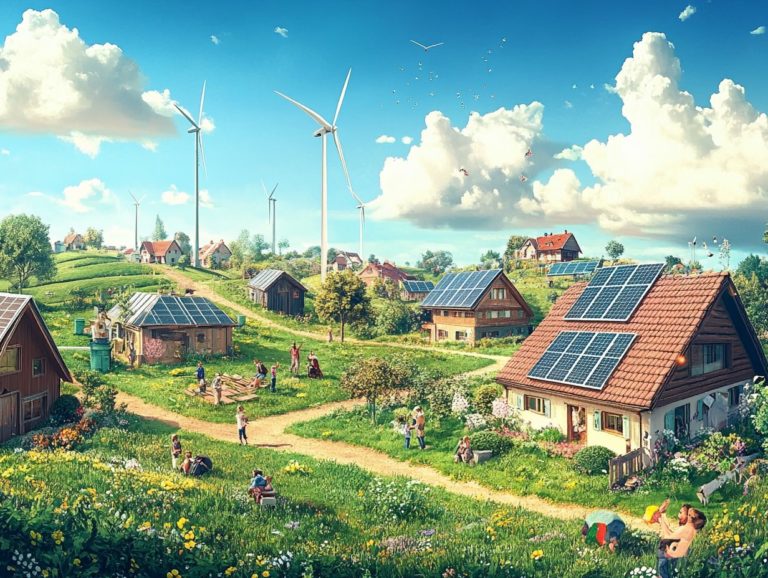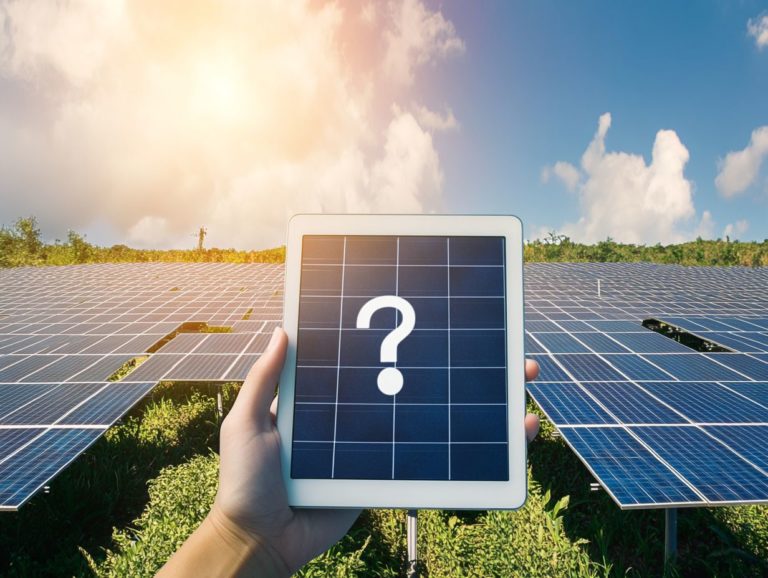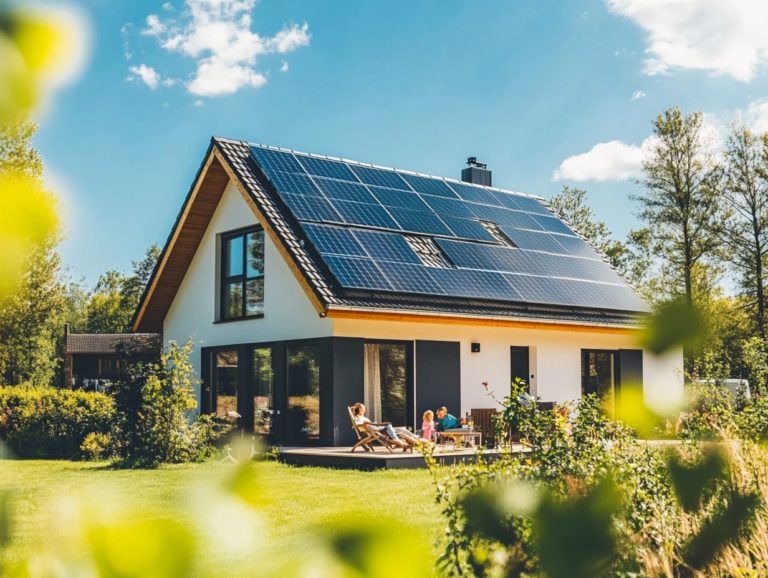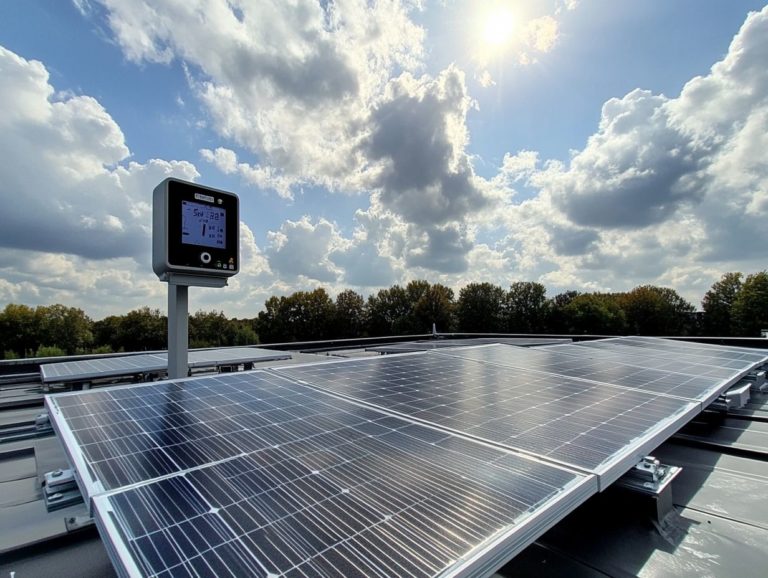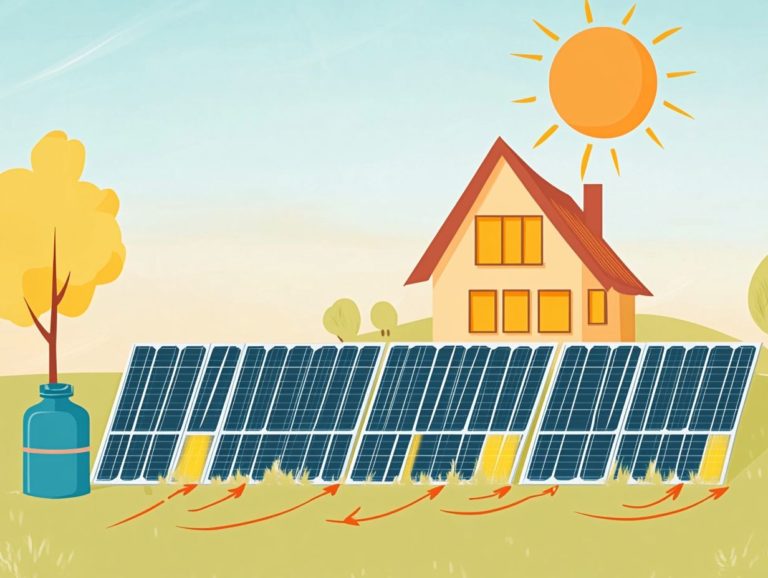“5 Common Questions About Solar Energy Answered”
Solar energy is swiftly emerging as a pivotal force in the pursuit of sustainable living, yet the sheer volume of information can be overwhelming to navigate.
This guide tackles five common questions that homeowners like you often have about solar energy covering everything from how it works and its environmental benefits to installation costs and whether it s a good fit for your home.
It also covers the different types of solar panels available, offers maintenance tips, and highlights potential savings on your utility bills.
Whether you re a curious novice or contemplating a solar upgrade, this guide will light your path to a greener future.
Contents
- Key Takeaways:
- 1. What Is Solar Energy and How Does It Work?
- 2. How Does Solar Energy Impact the Environment?
- 3. What Are the Benefits of Using Solar Energy?
- 4. How Much Does It Cost to Install Solar Panels?
- 5. Is Solar Energy Suitable for Every Home?
- Are There Any Government Incentives for Using Solar Energy?
- What Are the Different Types of Solar Panels Available?
- How Can a Homeowner Determine If Their Home Is Suitable for Solar Panels?
- What Is the Lifespan of Solar Panels?
- How Can Solar Energy Help with Reducing Utility Bills?
- What Are the Common Misconceptions About Solar Energy?
- How Can a Homeowner Maintain Their Solar Panels?
- What Happens to Solar Panels During Bad Weather?
- How Can a Homeowner Determine the Right Size of Solar Panel System for Their Home?
- What Are the Long-Term Savings of Using Solar Energy?
- Can Solar Energy Be Used in Conjunction with Other Energy Sources?
- Frequently Asked Questions
Key Takeaways:
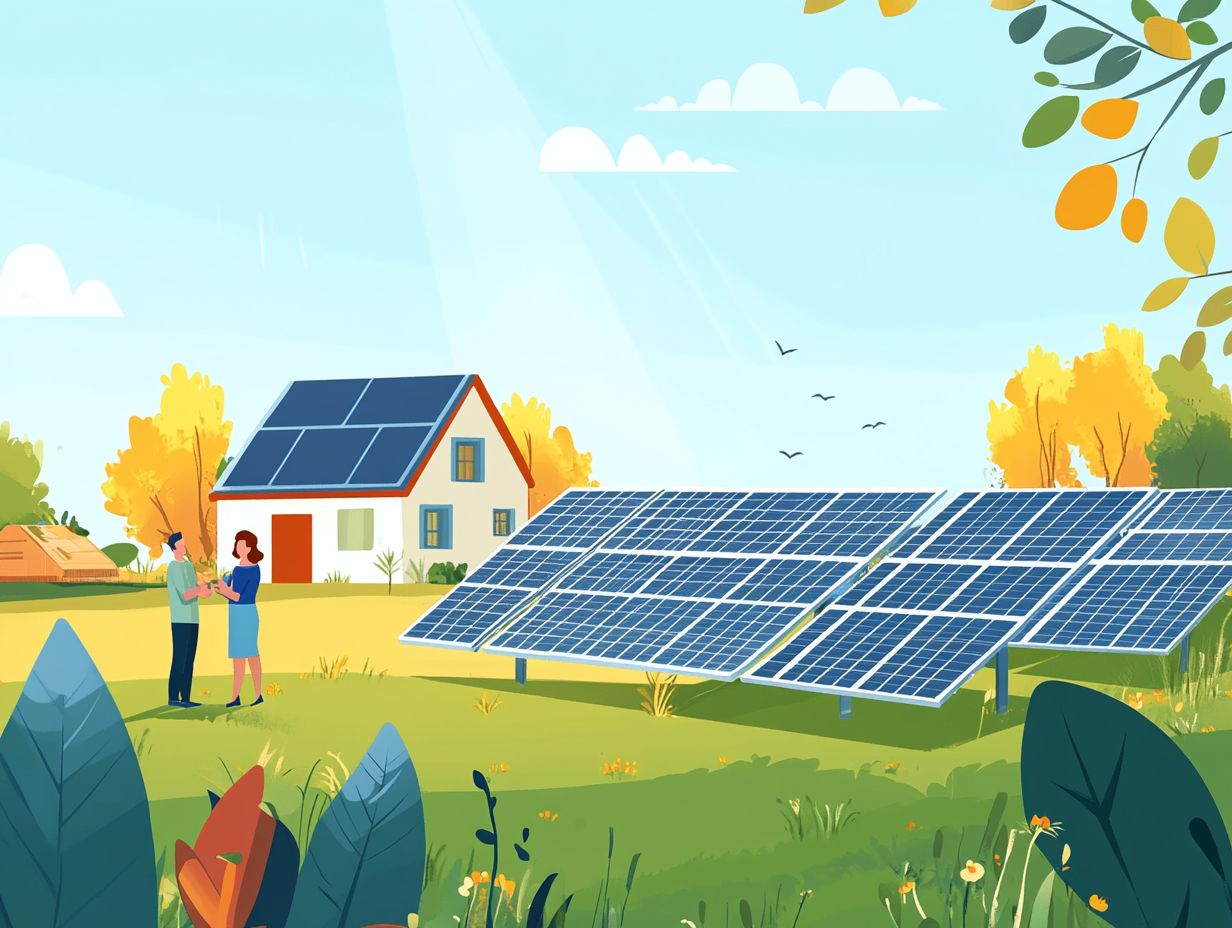
Solar energy is a renewable energy source that uses sunlight to create electricity, making it a clean and sustainable option for homes. Using solar energy helps reduce carbon emissions and combat climate change, making it an environmentally friendly choice. Solar energy can provide cost savings in the long run by reducing utility bills and potentially increasing the value of a home.
1. What Is Solar Energy and How Does It Work?
Solar energy, harnessed through modern solar panels, offers a sustainable source of clean energy that transforms sunlight into electricity.
These panels capture sunlight and help reduce fossil fuel use. Battery systems save this energy for when you need it, even at night, ensuring you have a consistent power supply.
Companies like are relentless in pushing the boundaries of solar technologies, making significant contributions to a greener economy. Their commitment highlights the transformative potential of renewable energy in tackling global challenges like climate change.
2. How Does Solar Energy Impact the Environment?
Solar energy enhances the environment by reducing reliance on fossil fuels and supporting green development initiatives.
By tapping into the sun s power, you can significantly reduce greenhouse gas emissions and provide a cleaner alternative that diminishes air pollution. For example, a recent study found that California’s transition to solar power has prevented the release of over 100 million tons of CO2.
Moreover, solar energy systems use far fewer natural resources than traditional energy sources, contributing to water conservation and protecting wildlife habitats essential for maintaining biodiversity.
Projects like the Solar Energy Generation Systems in Spain show how large-scale solar installations can restore natural landscapes while meeting energy demands, making a compelling case for integrating renewables into ecological preservation efforts.
3. What Are the Benefits of Using Solar Energy?
The advantages of embracing solar energy are substantial, offering significant savings on your utility bills while promoting sustainable practices.
When you invest in solar technology, you reduce your dependence on fossil fuels, leading to greater energy independence and minimizing fluctuations in energy prices.
This transition not only translates to economic savings but also aligns with your environmental aspirations, such as cutting down greenhouse gas emissions and fostering biodiversity.
Integrating solar energy into agriculture benefits related sectors by enabling more efficient water management and preserving arable land, ensuring food security and bolstering local economies.
4. How Much Does It Cost to Install Solar Panels?
The cost of installing solar panels can vary significantly based on the type of photovoltaic system you choose, the efficiency of the solar cells, and the specific component options available to you. These factors will influence both your upfront investment and your long-term savings.
Beyond the basic pricing, consider essential factors like equipment costs. This typically includes solar panels, inverters, and mounting systems.
Labor expenses are also crucial. Skilled technicians are necessary for a secure and efficient installation.
Don t overlook ongoing maintenance costs. While they may add to your overall investment, they tend to be minimal if you take good care of the system.
Exploring financing options, such as solar loans and leases, can significantly ease your initial expenses. Plus, many states offer incentives or tax credits that make the transition to renewable energy even more attractive.
5. Is Solar Energy Suitable for Every Home?
Solar energy brings incredible benefits, but is it right for your home? Factors like your location, roof orientation, shading, and the potential for integrated fishing and solar systems ( ) will play a big role in the decision.
Understanding your geographic context is essential. Regions with greater sun exposure are naturally more conducive to solar energy success.
It’s wise to evaluate your energy consumption patterns to determine the capacity required for an effective solar system.
Emerging technologies, such as battery storage and smart grid solutions, are game-changers in enhancing solar accessibility. These advancements enable more households to tap into solar benefits, regardless of prior limitations.
Not only do these innovations boost efficiency, but they also enable you to harness energy more effectively. This ensures that your investment in solar technology pays dividends in the long run.
Are There Any Government Incentives for Using Solar Energy?
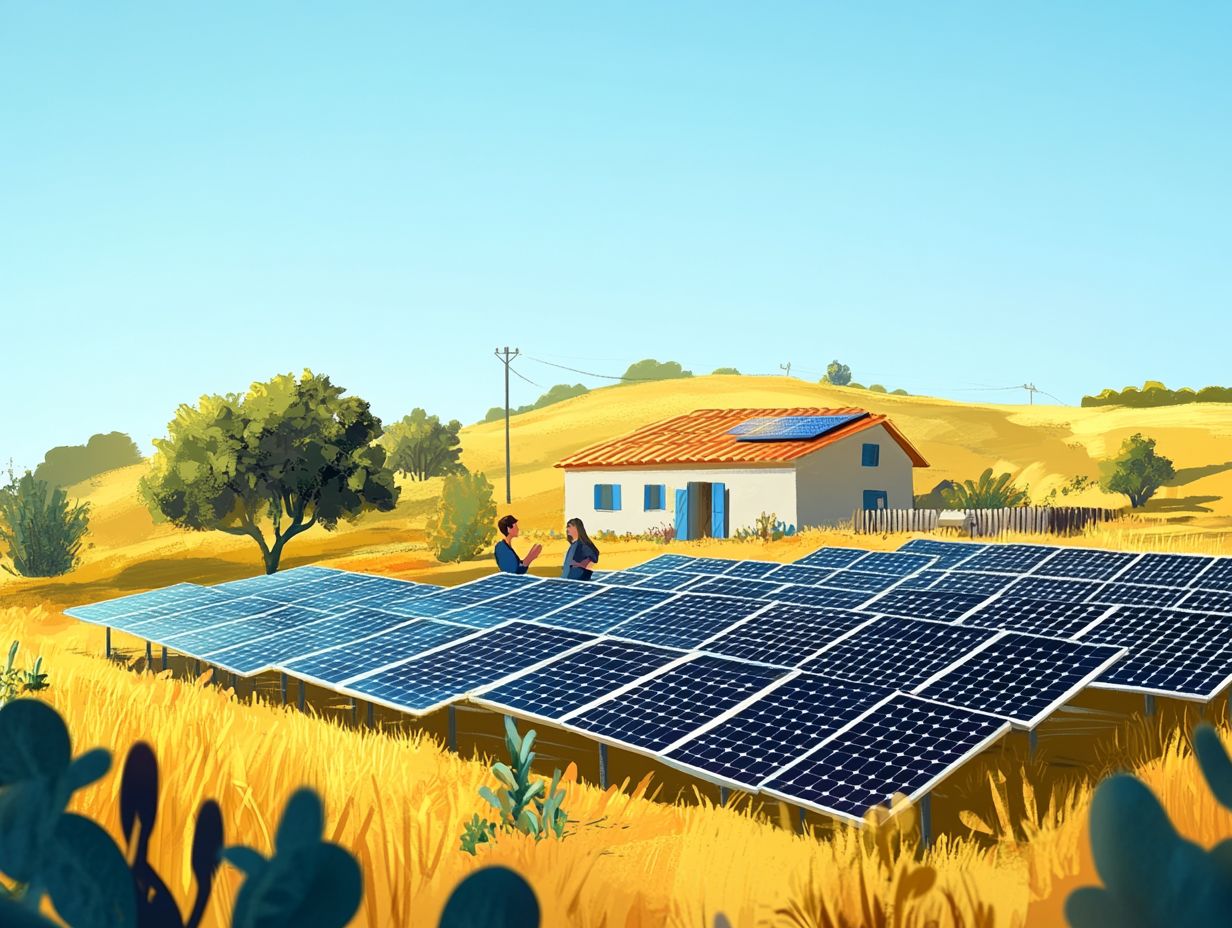
Government incentives are essential in driving the adoption of solar energy. They offer financial assistance, tax credits, and favorable policies that motivate both households and businesses to invest in clean energy solutions for a more sustainable future.
These incentives come in various forms:
- Federal tax credits reduce your overall tax liabilities.
- State grants provide direct funding for installation costs.
- Rebates help lower upfront expenses.
For homeowners like you, these financial aids can significantly reduce the cost barriers tied to installing solar panels, making the switch to renewable energy more accessible and appealing.
Businesses also see these incentives as critical to their investment strategies. These incentives enhance return on investment and contribute to long-term operational savings. This combination of financial support accelerates solar adoption and bolsters the collective movement toward a greener economy.
What Are the Different Types of Solar Panels Available?
You ll find a variety of solar panels on the market. There are two main types of solar panels: monocrystalline panels and polycrystalline panels. Monocrystalline panels are made from a single crystal structure, while polycrystalline panels are made from multiple crystals.
Monocrystalline panels stand out for their sleek design and impressive energy conversion rates. They typically outperform polycrystalline options, though they tend to come with a higher price tag.
On the other hand, polycrystalline panels offer a more wallet-friendly alternative. This makes them an excellent choice for residential projects where budget considerations are paramount.
Emerging technologies like thin-film solar panels and bifacial modules are also gaining popularity. Their lightweight design and ability to capture sunlight from both sides enhance overall efficiency, making them an exciting option.
Market trends reveal a growing enthusiasm for sustainable materials and innovative manufacturing processes. These trends are likely to shape consumer preferences in the near future as society increasingly embraces greener energy solutions.
How Can a Homeowner Determine If Their Home Is Suitable for Solar Panels?
You can determine if your home is a good candidate for solar panels by evaluating key factors like roof orientation, shading, and your overall energy consumption.
Consider integrating solutions that promote green development, such as modern farming practices.
To truly grasp your solar potential, examine the pitch and material of your roof, along with its directional orientation. These elements play a crucial role in how much sunlight your panels will receive.
Keep in mind the local climate, average sunshine hours, and any obstructions from nearby trees or buildings, as these can significantly impact efficiency.
It s wise to assess your current energy usage and future needs. This insight will help you choose the right size and type of solar system, paving the way for a more efficient and sustainable energy solution tailored to your lifestyle.
What Is the Lifespan of Solar Panels?
The lifespan of solar panels typically spans 25 to 30 years, featuring high-efficiency components designed to minimize maintenance while maximizing energy output from solar cells.
Several factors can significantly influence this longevity. For instance, the quality of the solar panels plays a pivotal role; choosing top-tier manufacturers often comes with warranties that reflect their confidence in durability.
Proper installation is crucial as well. Panels that are not installed correctly may face premature wear or damage.
Regular maintenance practices, such as keeping the panels clean and free from debris, can ensure they continue to perform at their best.
Additionally, homeowners should consider routine inspections to check for any signs of wear or inefficiencies, ultimately extending the lifespan of their solar investment.
How Can Solar Energy Help with Reducing Utility Bills?
By harnessing solar energy with efficient solar panels, you can dramatically cut down on your utility bills by generating your own clean energy. This allows you to enjoy the financial benefits of reduced electricity costs while consistently producing green power.
Imagine saving 20% to 50% on your monthly utility expenses after making the switch to solar! Over time, these reductions can add up to thousands of dollars, giving you the freedom to invest in other essential aspects of your life.
Solar energy systems often include attractive incentives like tax credits and rebates, further enhancing your financial relief.
The long-term benefits of this investment lead to significant savings, boost your property value, and provide a safeguard against fluctuating energy prices.
In this way, you can enjoy both immediate and lasting financial advantages.
What Are the Common Misconceptions About Solar Energy?
Common misconceptions about solar energy, such as the belief that it s ineffective in cloudy climates or that the initial costs are prohibitively high, undermine its true potential as a viable clean energy solution.
These myths create a misunderstanding of how solar technology operates and its actual performance in varying weather conditions. In reality, regions with frequent cloud cover, like Germany, have successfully harnessed solar energy, demonstrating that even when the sun plays hide-and-seek, solar panels can still generate impressive amounts of power.
Regarding expenses, those initial investments can be offset by long-term savings on energy bills, not to mention the various incentives available.
As communities and businesses increasingly recognize the advantages of transitioning to renewable energy sources, it’s essential to debunk these myths. This effort will help foster broader acceptance and encourage informed decisions for a truly sustainable future.
Don t wait! Explore how solar energy can change your life today!
- Cut your utility bills dramatically and enjoy worry-free energy costs!
- Experience long-term savings and financial relief from tax credits and rebates.
- Boost your property value with a sustainable energy source.
How Can a Homeowner Maintain Their Solar Panels?
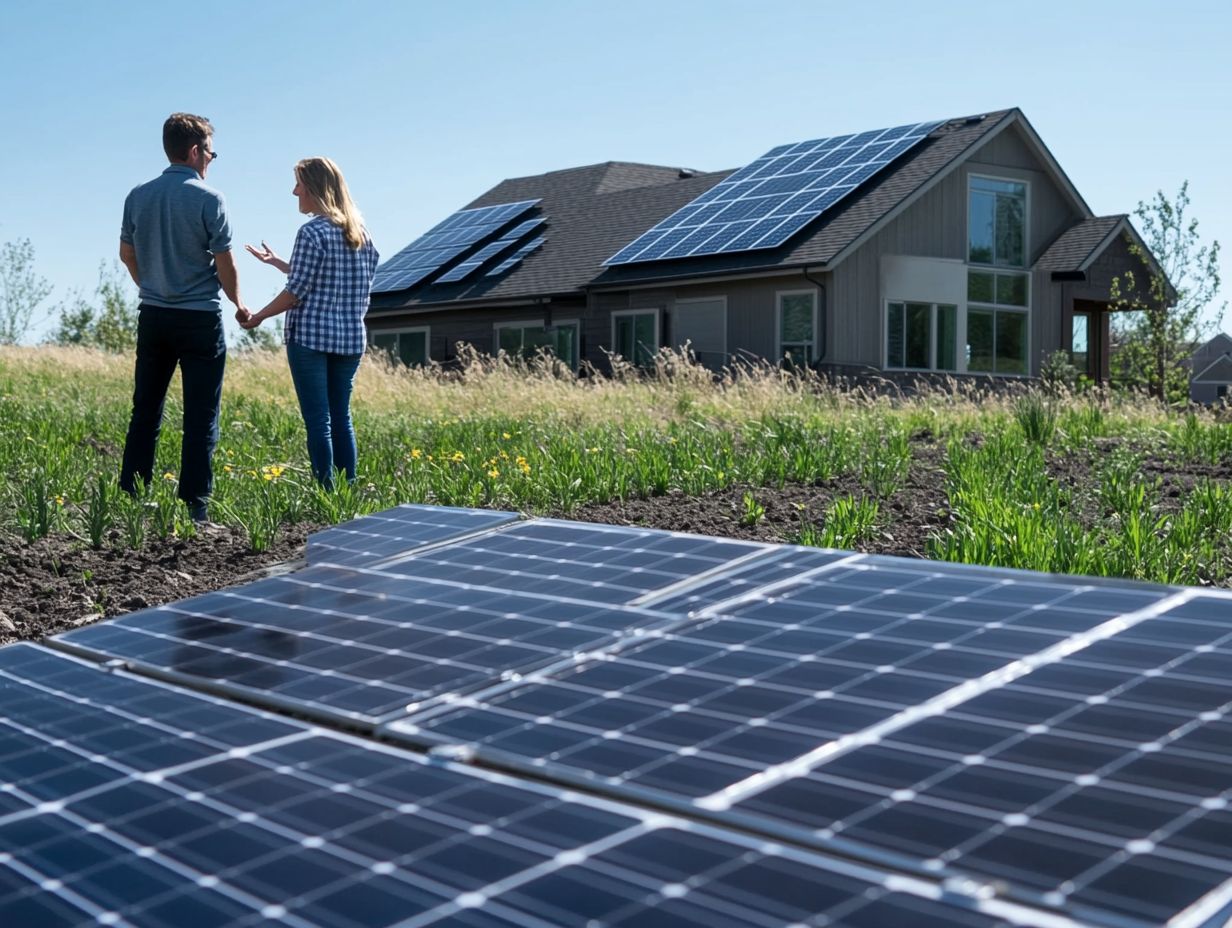
Maintaining your solar panels is crucial for maximizing their performance. Regular maintenance helps to keep your system operating efficiently, providing a reliable source of clean energy.
Stay ahead of potential issues! Simple tasks like removing debris, checking for cracks or loose connections, and monitoring the system s energy output are essential.
Regular cleanings help prevent dust and grime from blocking sunlight. This allows your panels to operate at their best. Periodic inspections let you catch potential damage early, ultimately saving you from costly repairs.
With these measures in place, your solar system won’t just generate energy effectively; it will also remain a valuable asset for years to come.
What Happens to Solar Panels During Bad Weather?
During bad weather, such as heavy rain or snow, solar panels are engineered to endure the elements. This ensures that your solar installations remain secure and continue to perform effectively.
These panels use strong materials, such as tempered glass and corrosion-resistant frames, providing protection against hail, wind, and debris. Proper installation is vital; panels must be mounted securely to prevent them from being dislodged during storms.
Many systems come with safety features, such as surge protectors and grounding mechanisms, designed to minimize risks from lightning strikes.
After storms, act fast! Conduct a thorough assessment for any visible damage. Check for cracks and ensure that electrical connections remain intact, allowing for a swift return to optimal functionality.
How Can a Homeowner Determine the Right Size of Solar Panel System for Their Home?
Determining the ideal size of your solar panel system involves assessing your household’s energy consumption patterns and anticipated clean energy needs. This ensures optimal performance and aligns with green development initiatives.
Start by looking at your past utility bills it s eye-opening! This analysis will help you pinpoint peak consumption months and discern overall energy trends.
Next, consider any future changes, such as home renovations or adding energy-intensive appliances.
Once you have a clear understanding, consulting with reputable solar providers becomes essential. These experts can provide tailored assessments based on geographical factors, local sunlight exposure, and your building infrastructure.
This comprehensive approach enables you to make a well-informed decision that maximizes your energy efficiency.
What Are the Long-Term Savings of Using Solar Energy?
Investing in solar energy can yield substantial long-term savings. You ll likely see a significant reduction in your electricity bills, potential tax benefits, and an increase in your property value linked to energy-efficient upgrades.
Imagine slashing your electricity bills and watching your property value soar! These benefits become clearer when you consider the broader financial picture, including installation costs and ongoing maintenance.
Many reports suggest that the return on investment (ROI) for solar installations can vary between 10% and 20%, making it a wise financial decision over time.
As the years go by, the savings from lowered energy expenses often surpass the initial costs, leading to a payback period that typically ranges from 5 to 7 years.
With ongoing advancements in technology, efficiency improvements are making solar solutions even more attractive. This further solidifies the case for embracing this sustainable energy source.
Contact your local solar provider today to explore your options and start saving!
Can Solar Energy Be Used in Conjunction with Other Energy Sources?
Yes, you can combine solar energy with other sources like wind or hydro. This mix enhances energy security and supports sustainability.
When combined, these renewable sources increase energy production and reduce reliance on fossil fuels. Hybrid systems create a more dependable power supply, optimizing energy use by balancing production and demand.
For instance, on sunny days, your solar panels can generate excess energy that you can store or use to power systems that depend on wind or hydropower during less favorable conditions.
This synergy not only leads to cost savings but also plays a vital role in the global movement toward energy independence and sustainability. It helps you minimize your carbon footprint and contribute to a cleaner environment.
Frequently Asked Questions
What is solar energy?
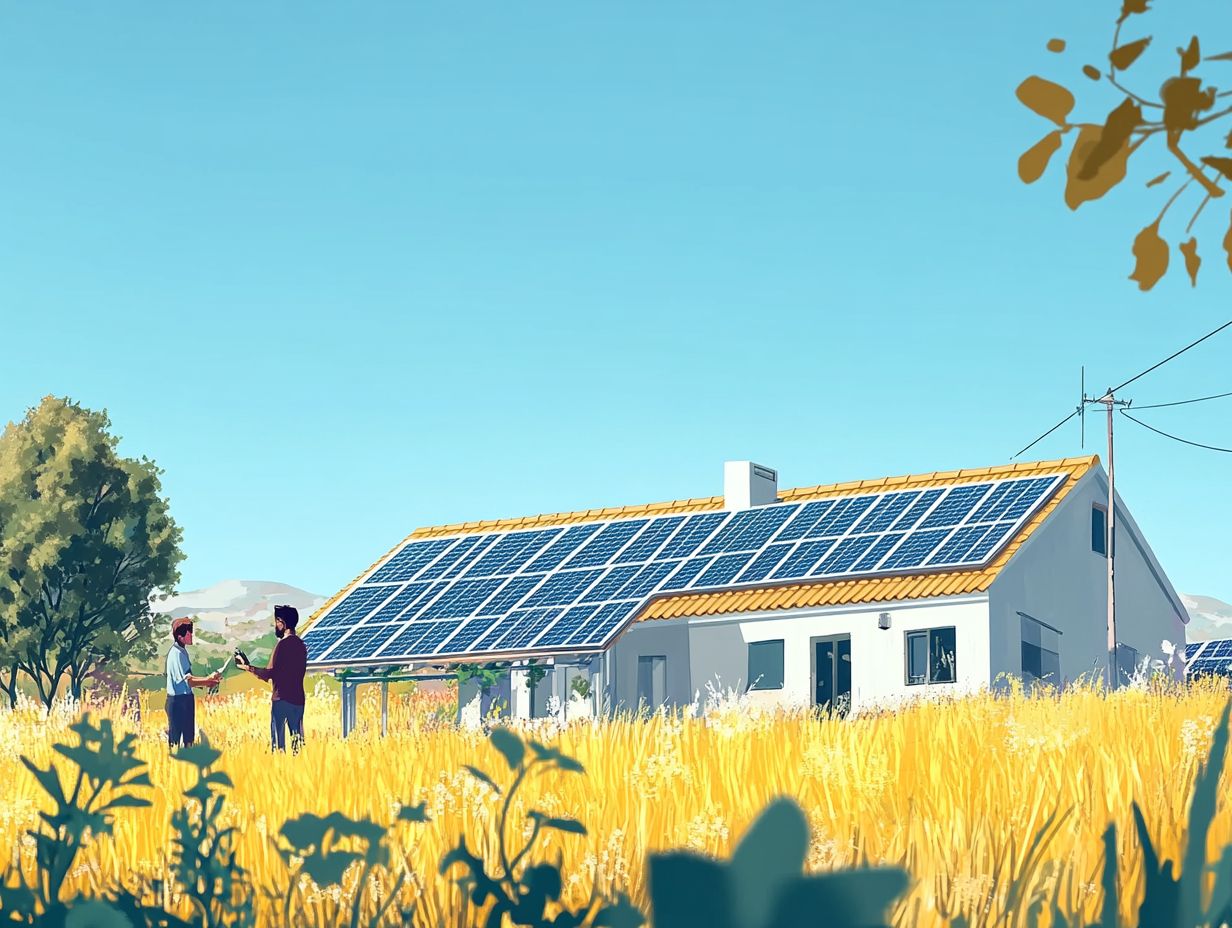
Solar energy is a type of renewable energy produced by harnessing the power of the sun. It is a clean and sustainable source of energy that can power homes, businesses, and even entire cities.
How is solar energy changing the world?
Solar energy changes the world by reducing our dependence on non-renewable resources, lowering carbon emissions, and creating new industries and job opportunities. It also provides access to electricity for remote and underdeveloped areas, improving the standard of living for many.
What is the role of solar energy in agriculture?
Solar energy can significantly improve the efficiency and sustainability of the agricultural industry. It can power irrigation systems, provide electricity for farm equipment, and be used for food processing and storage. This technology also reduces the industry’s carbon footprint and promotes eco-friendly practices.
How can businesses benefit from using solar energy?
Businesses can save on energy costs and improve their reputation by using solar energy. Investing in solar panels lowers energy expenses and demonstrates a commitment to sustainable development, which can attract eco-conscious customers and investors.
What is the importance of knowledge transfer in the solar energy industry?
Knowledge transfer is crucial in the solar energy industry to promote technological advancements and innovations. By sharing expertise, companies can collaborate to improve the efficiency and effectiveness of solar energy production, driving the industry towards sustainable development.
How can solar energy be used in the food production industry?
Solar energy can power equipment and facilities in food production, reducing carbon emissions and promoting sustainable farming practices. It can also be used for food processing and storage, ensuring food safety and quality. The adoption of solar energy in this industry contributes to global carbon neutrality and sustainable development.
Join the renewable energy revolution today and be a part of a brighter, cleaner future!

